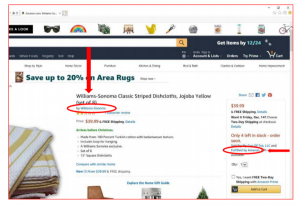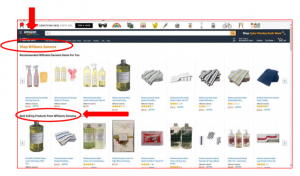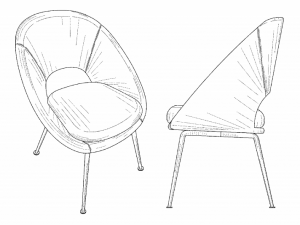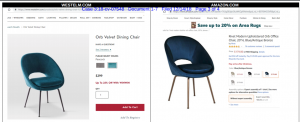On Friday, December 14th, San Francisco, CA-based home furnishing retailer Williams-Sonoma filed a lawsuit in the Northern District of California alleging claims of trademark and design patent infringement against Seattle, WA-based e-commerce giant Amazon.com. The lawsuit targets Amazon’s pattern of trading upon Williams-Sonoma’s goodwill and infringing the company’s intellectual property including the use of the registered mark “WILLIAMS-SONOMA.” If the allegations are true, this is simply the latest instance of this e-commerce behemoth choosing to flout IP law in an effort to line the pockets of itself and its incredibly affluent CEO Jeff Bezos.
 Williams-Sonoma complaint notes that it has operated an online storefront to sell its own branded furnishings since 1999, “long before significant penetration of broadband internet services into the U.S. market.” While Williams-Sonoma products are sold at more than 600 retail stores and through catalogs, more than 50 percent of the company’s sales occur through its online e-commerce platform. As a measure of protecting the integrity of its brand, Williams-Sonoma notes that it doesn’t license the use of the WILLIAMS-SONOMA mark in connection with online retail services.
Williams-Sonoma complaint notes that it has operated an online storefront to sell its own branded furnishings since 1999, “long before significant penetration of broadband internet services into the U.S. market.” While Williams-Sonoma products are sold at more than 600 retail stores and through catalogs, more than 50 percent of the company’s sales occur through its online e-commerce platform. As a measure of protecting the integrity of its brand, Williams-Sonoma notes that it doesn’t license the use of the WILLIAMS-SONOMA mark in connection with online retail services.
 Despite this, Williams-Sonoma alleges that, without its authorization, Amazon began using a mark identical to the WILLIAMS-SONOMA mark to retail competing goods. On its platform, Amazon lists products that are identified both as Williams-Sonoma products in the title and as being sold by Williams-Sonoma. Amazon also operates a “Shop Williams-Sonoma” page which isn’t authorized by the company and uses the company’s own copyrighted images of its products. Other sections found on Amazon’s website, including “Best Selling Products from Williams-Sonoma,” and targeted email advertisements enhance consumer confusion by leading customers into thinking that Amazon is an authorized retailer of Williams-Sonoma goods.
Despite this, Williams-Sonoma alleges that, without its authorization, Amazon began using a mark identical to the WILLIAMS-SONOMA mark to retail competing goods. On its platform, Amazon lists products that are identified both as Williams-Sonoma products in the title and as being sold by Williams-Sonoma. Amazon also operates a “Shop Williams-Sonoma” page which isn’t authorized by the company and uses the company’s own copyrighted images of its products. Other sections found on Amazon’s website, including “Best Selling Products from Williams-Sonoma,” and targeted email advertisements enhance consumer confusion by leading customers into thinking that Amazon is an authorized retailer of Williams-Sonoma goods.
The complaint goes on to allege that Amazon’s actions have caused irreparable harm to consumer goodwill behind the Williams-Sonoma brand. Reviews found online regarding the “Williams-Sonoma” goods sold by Amazon include numerous complaints regarding products shipped without the necessary components, products sold at higher prices than are available on Williams-Sonoma’s own website and products that, on delivery, don’t meet the advertised specifications of those products. One particular example of the brand damage caused by consumer confusion cited by Williams-Sonoma is a November 2018 communication between a customer who told an employee at a Williams-Sonoma branded retail store that the customer was “appalled” that Williams-Sonoma would double the price of its products sold on Amazon. In another example, certain Williams-Sonoma branded furnishings have been advertised as including leather but upon delivery customers have found that they instead use a faux leather substitute.
 Williams-Sonoma also argues that Amazon has engaged in deliberate copying of its intellectual property behind its West Elm brand of furniture for Amazon’s Rivet brand. Products sold under the Rivet brand are allegedly “colorable imitations” of Williams-Sonoma’s distinctive patented and proprietary designs. “It is implausible Amazon could have conceived of a product line with nearly identical product designs which feature product names containing the very same non-descriptive terms WSI uses in connection with those products, other than by intentionally undertaking to copy WSI’s West Elm product line and appropriate the trademarks WSI uses in connection with that line,” the complaint reads.
Williams-Sonoma also argues that Amazon has engaged in deliberate copying of its intellectual property behind its West Elm brand of furniture for Amazon’s Rivet brand. Products sold under the Rivet brand are allegedly “colorable imitations” of Williams-Sonoma’s distinctive patented and proprietary designs. “It is implausible Amazon could have conceived of a product line with nearly identical product designs which feature product names containing the very same non-descriptive terms WSI uses in connection with those products, other than by intentionally undertaking to copy WSI’s West Elm product line and appropriate the trademarks WSI uses in connection with that line,” the complaint reads.
 Of particular note is Amazon’s alleged copying of West Elm’s Orb chair, the design of which is covered by U.S. Patent No. D815452, titled Chair. The Orb chair has been a commercial success for Williams-Sonoma, exceeding $2 million in sales during the first 10 months of 2018. In March 2018, Amazon began selling an Orb Chair that “is so highly similar that the ordinary observer would be confused by the imitation” thanks to the identical design and the use of the exact same non-descriptive word mark. Williams-Sonoma further pushed its trademark infringement claims against Rivet’s Industrial Slope Top-Grain Leather Swivel Office Chair, which is very similar to West Elm’s Slope Leather Swivel Office Chair.
Of particular note is Amazon’s alleged copying of West Elm’s Orb chair, the design of which is covered by U.S. Patent No. D815452, titled Chair. The Orb chair has been a commercial success for Williams-Sonoma, exceeding $2 million in sales during the first 10 months of 2018. In March 2018, Amazon began selling an Orb Chair that “is so highly similar that the ordinary observer would be confused by the imitation” thanks to the identical design and the use of the exact same non-descriptive word mark. Williams-Sonoma further pushed its trademark infringement claims against Rivet’s Industrial Slope Top-Grain Leather Swivel Office Chair, which is very similar to West Elm’s Slope Leather Swivel Office Chair.
Unfortunately, the idea that Amazon enables the sale of goods that infringe upon trademark or patent rights is an old story that continues to be told over and over again. In October 2017, German automaker Daimler AG sued Amazon for its complicity in the sale of counterfeit Mercedes-Benz parts. Consumer tech giant Apple has claimed that 90 percent of Apple-branded items on Amazon are counterfeits. In recent months, both the Federal Communications Commission and the Government Accountability Office have called out Amazon for allowing the sale of counterfeit set-top boxes and other items. However, given the fact that CEO Jeff Bezos is knowingly complicit in the sale of counterfeit goods on Amazon, it’s not likely that the situation will change any day soon without major intervention from law enforcement.

![[IPWatchdog Logo]](https://ipwatchdog.com/wp-content/themes/IPWatchdog%20-%202023/assets/images/temp/logo-small@2x.png)


![[Advertisement]](https://ipwatchdog.com/wp-content/uploads/2024/05/Quartz-IP-May-9-2024-sidebar-700x500-1.jpg)
![[Advertisement]](https://ipwatchdog.com/wp-content/uploads/2024/04/Patent-Litigation-Masters-2024-sidebar-700x500-1.jpg)

![[Advertisement]](https://ipwatchdog.com/wp-content/uploads/2021/12/WEBINAR-336-x-280-px.png)
![[Advertisement]](https://ipwatchdog.com/wp-content/uploads/2021/12/2021-Patent-Practice-on-Demand-recorded-Feb-2021-336-x-280.jpg)
![[Advertisement]](https://ipwatchdog.com/wp-content/uploads/2021/12/Ad-4-The-Invent-Patent-System™.png)






Join the Discussion
One comment so far.
Steve
December 31, 2018 02:12 pmOne issue I see over and over again is that, apparently, authentic merchandise is being comingled at the warehouse. This results in customers “returning” inferior counterfeit merchandise to the merchant of authentic merchandise. Perhaps this complaint will also address this issue?